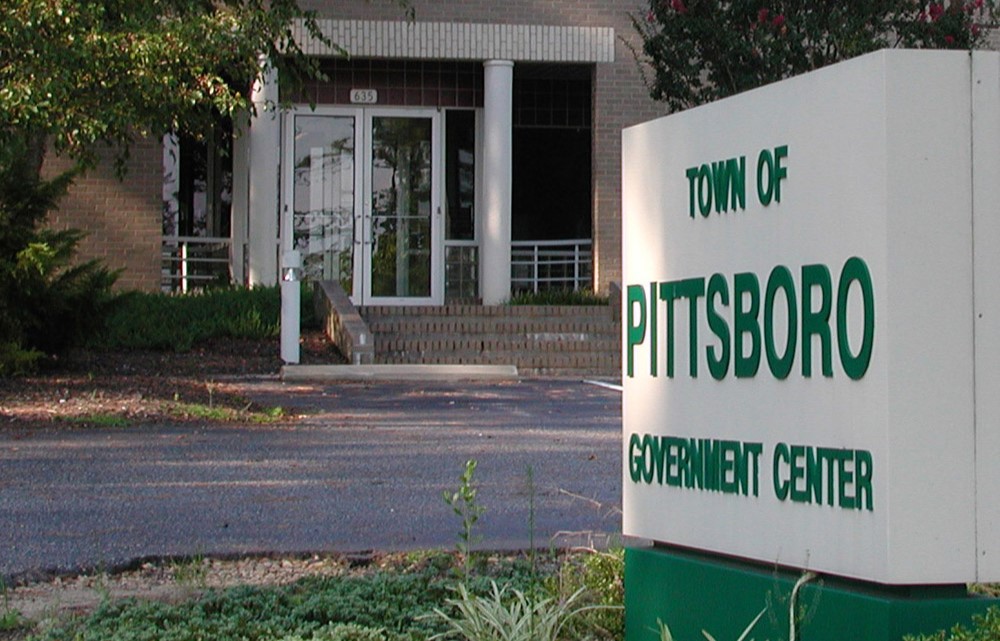Cory Saulsbury, the superintendent for Pittsboro’s Water Treatment Plant, walks around outside, stepping on the grates above slowly churning water at the town facility off 15-501. As he gives a tour, he shares how the raw water captured from the Haw River just a mile up the road gets cleaned and filtered before going through treatment to be used as drinking water for residents.
“This is all everything from the river – all the dirt and everything you can see forms these balls, and this is what we call our flocculation process,” says Saulsbury. “This is the coagulation and what we call ‘floc.’”
The floc becomes more and more separated from the water as it moves to different basins, eventually gathering at the bottom to where it can be taken out of the water and used as “sludge” – which Saulsbury says the town offers as nutrient-rich fertilizer.
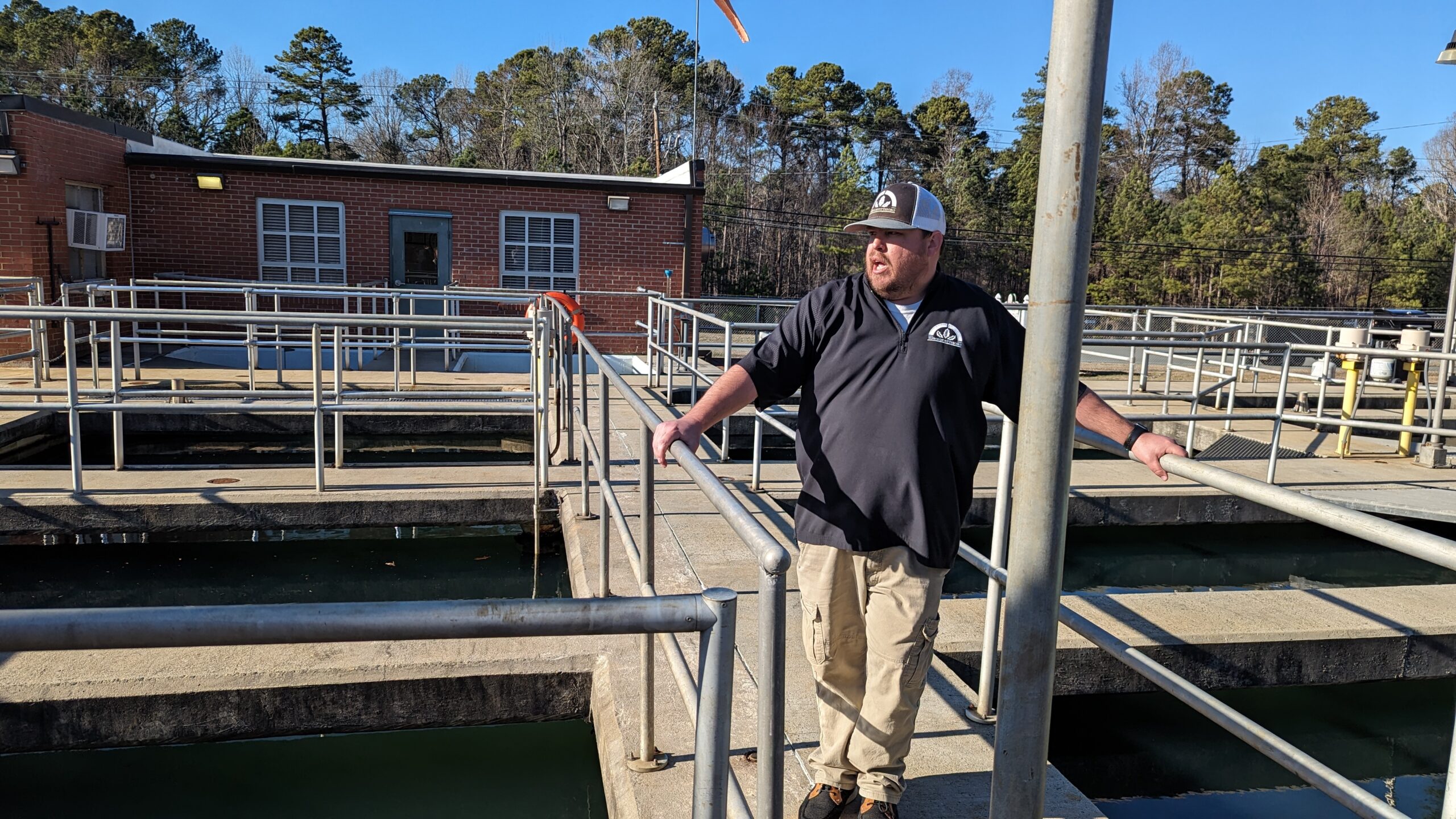
Cory Saulsbury, the superintendent of Pittsboro’s water treatment plant, stands outside and gives a tour around the basins.
Inside the treatment plant, Saulsbury and his staff have colorful screen displays where they control the cleaning and filtration process of the raw water. He points out those sections, as well as how much water is being taken in from the Haw River and how much is available in the town’s water towers on another screen.
“We can see our pumps, which pumps we’re going to run,” Saulsbury says. “We can see how much we’ve [gotten from the] raw flow today. Right now, we’re at 715,00 gallons [so far] and we’ll be running until 11 o’clock tonight, so it’ll be…probably about a million [gallons].”
Those raw intake numbers are back up to normal after more than two weeks of drawing only minimal amounts. After receiving an alert from the City of Burlington about a release of the chemical 1,4 Dioxane into the Haw on January 24, Saulsbury and his team limited their pulls from the river to just four or five times a day to only meet the town’s immediate water demands.
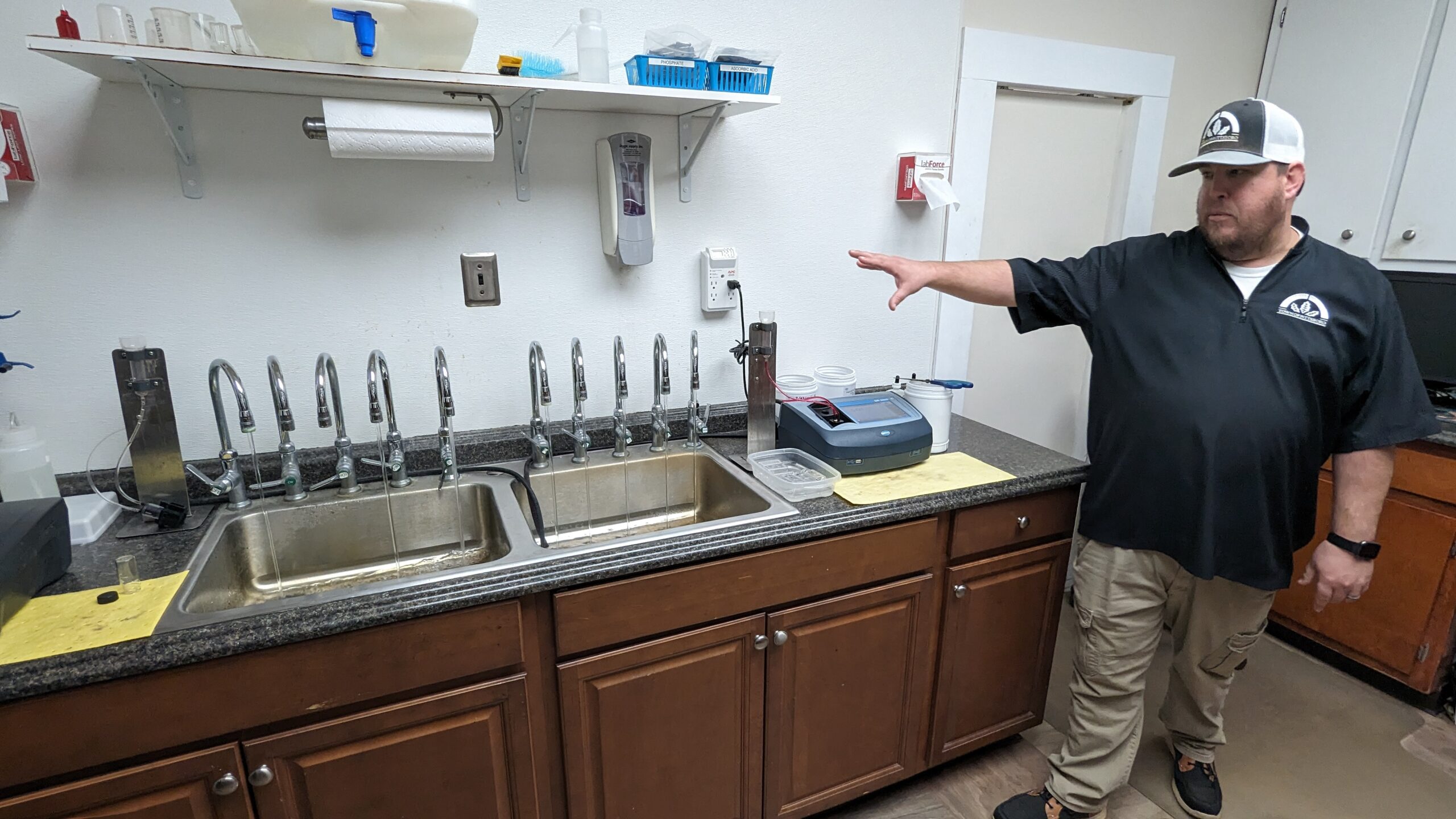
Saulsbury gestures at seven spouts of running water from each of Pittsboro’s intake sites and treated basins. The setup allows the town to quickly grab water samples for testing, especially when there’s a chemical release from upstream.
Limiting that intake – and all the other water cleaning process at the treatment plant – helps Pittsboro try to keep its drinking water free of contaminants, which is challenging when pulling from a source like the Haw River. Saulsbury, other town employees, and residents are held by the actions of those upstream that release chemicals into the water – faced with either using less water or running the risk of getting sick.
To highlight both Pittsboro’s efforts and the need for wider regulation of threats to water quality, North Carolina Attorney General Josh Stein and House Minority Leader Robert Reives joined Mayor Kyle Shipp on February 15 for a press conference at the water treatment plant.
Reives, who represents Pittsboro and Chatham County in District 54, said the state government holds some of the responsibility for preventing and responding to contaminants. He said he believes laws should be strengthened and more severe consequences levied to companies who release into water sources, calling the lack of movement by North Carolina “frustrating.”
“A slap on the wrist is nothing when communities like Pittsboro have to work day and night just to ensure residents have clean drinking water,” said Reives. “I’m willing to work with anyone who wants to ensure safe drinking water is a priority and not an afterthought.”
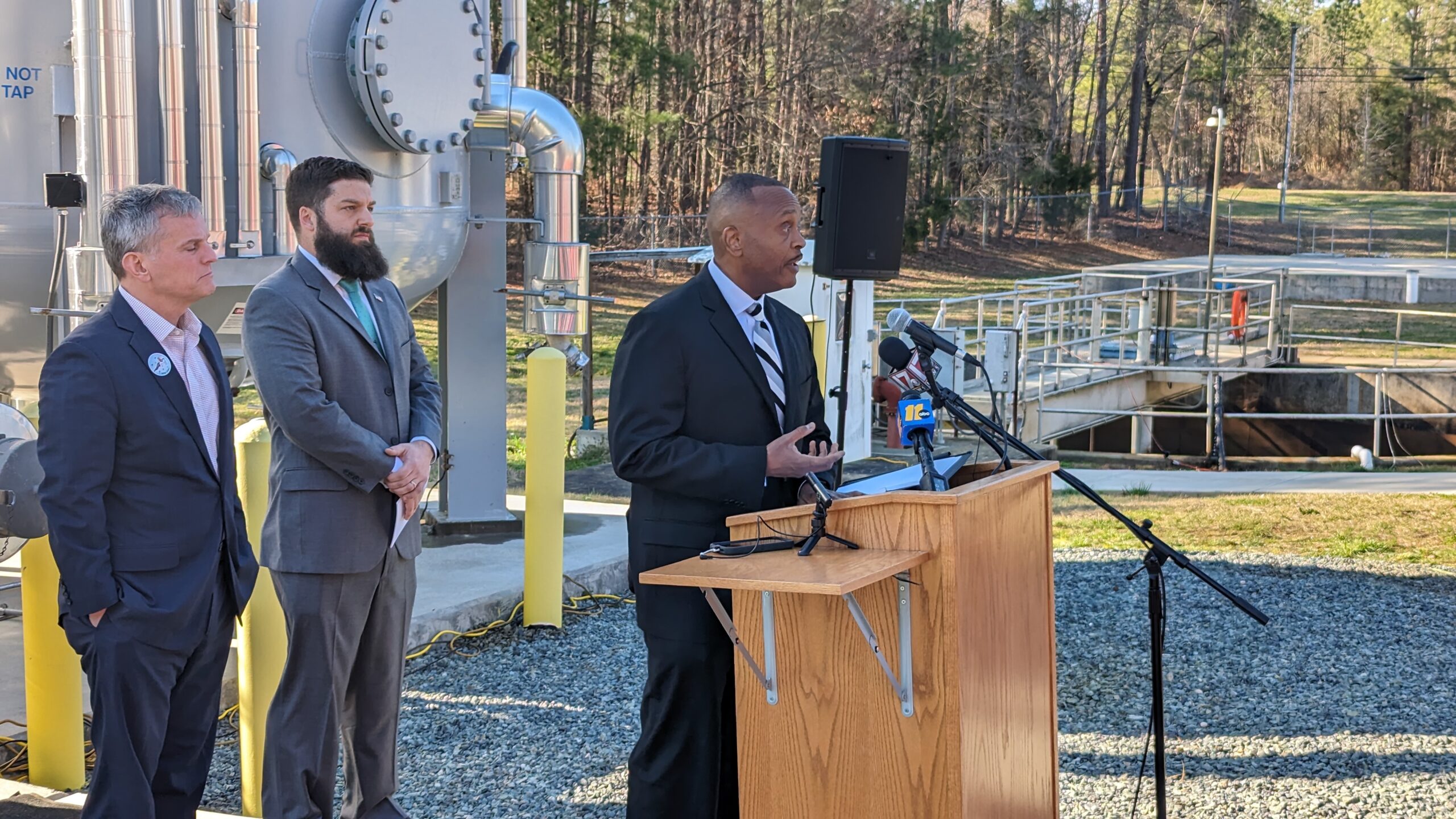
Rep. Robert Reives speaks during a press conference with North Carolina Attorney General Josh Stein and Pittsboro Mayor Kyle Shipp about their commitment to water quality on February 15, 2024.
The press conference came just three days after the Town of Pittsboro filed a notice of intent to sue Apollo Chemical – a company based in Burlington – for violating the Clean Water Act with its releases into public water. Shipp told Chapelboro that the town had already been seeking such legal options before the latest 1,4 Dioxane release in January, for which he said Apollo is also believed to be the source.
Stein echoed those sentiments, pointing to the work his office has done to set precedents in court even if few laws have been passed. He cited earning the largest environmental fine in state history based on a case against the chemical company Chemours releasing into the Cape Fear River. Stein named other litigation pushing to punish corporations who create shell companies to absorb damages from water quality lawsuits.
The attorney general said he believes chemical industry leaders have to come to the table to work with the government on improving regulations – otherwise, he pledged his office “will not hesitate to take action” when residents’ health is put at risk.
“When you turn on a faucet at home, you should never have to worry is that water going to make your loved one sick,” said Stein. “You shouldn’t have to worry about giving your kids a bath in the bathtub. You should never doubt that water is clean. And while I appreciate the Town of Pittsboro’s initiative, you shouldn’t have to bring water jugs and bottles to a collection agency to get specially treated water. That is not what we want for the people of North Carolina.”
Stein referenced the town’s protocol of offering free, reverse-osmosis and ultra-violet filtered water whenever the town slows its intake from the Haw River. But that’s just when 1,4 Dioxane spills are caught. Pittsboro recently spent $3 million to install a granulated-activated carbon system to help filter out forever chemicals (categorized as PFAS and PFOA) that are not regulated.
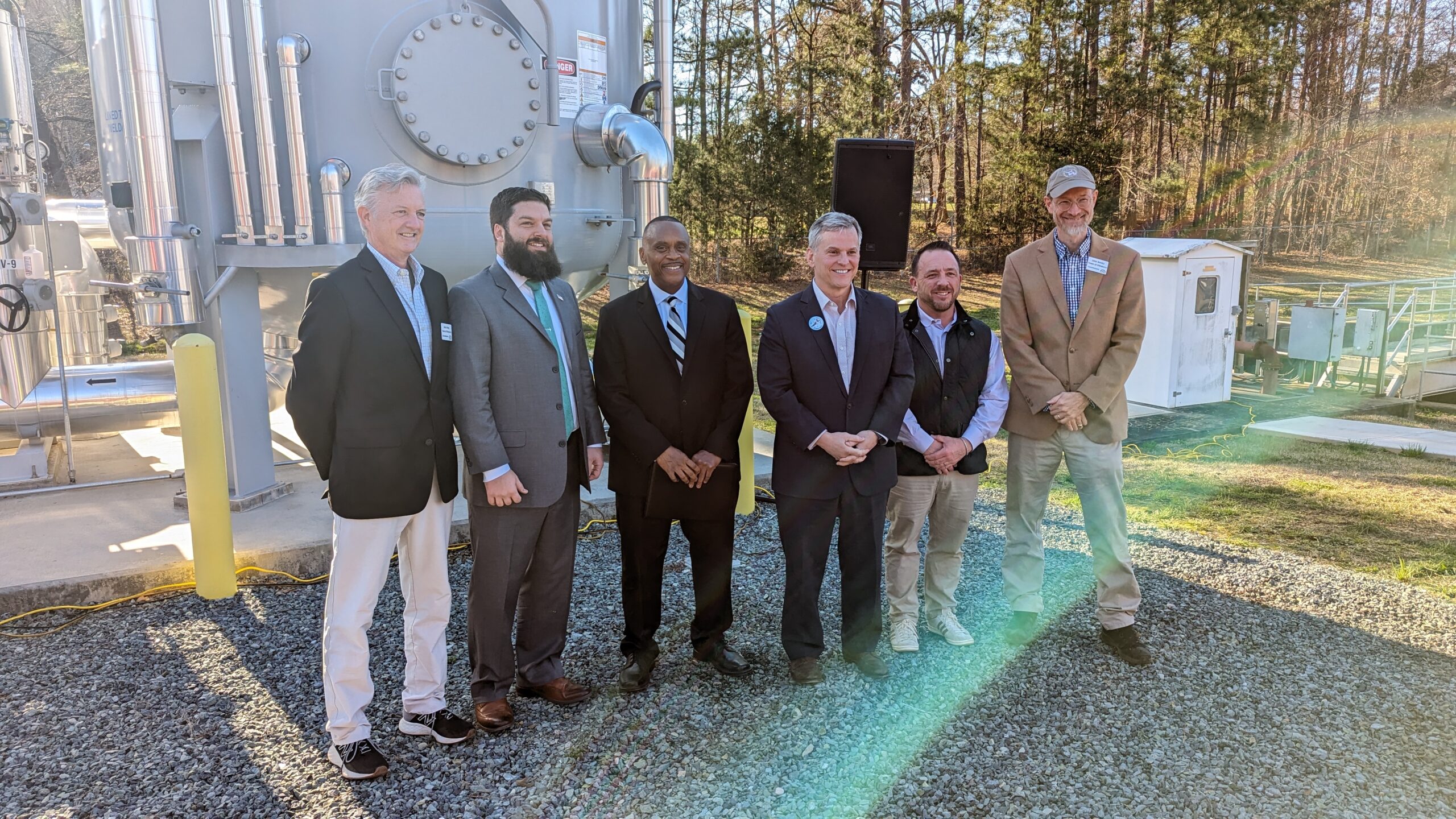
From left to right: Pittsboro Commissioner John Foley, Mayor Kyle Shipp, Rep. Robert Reives, NC Attorney General Josh Stein, Commissioner James Vose, and Commissioner John Bonitz pose for a photo in front of Pittsboro’s GAC System tanks.
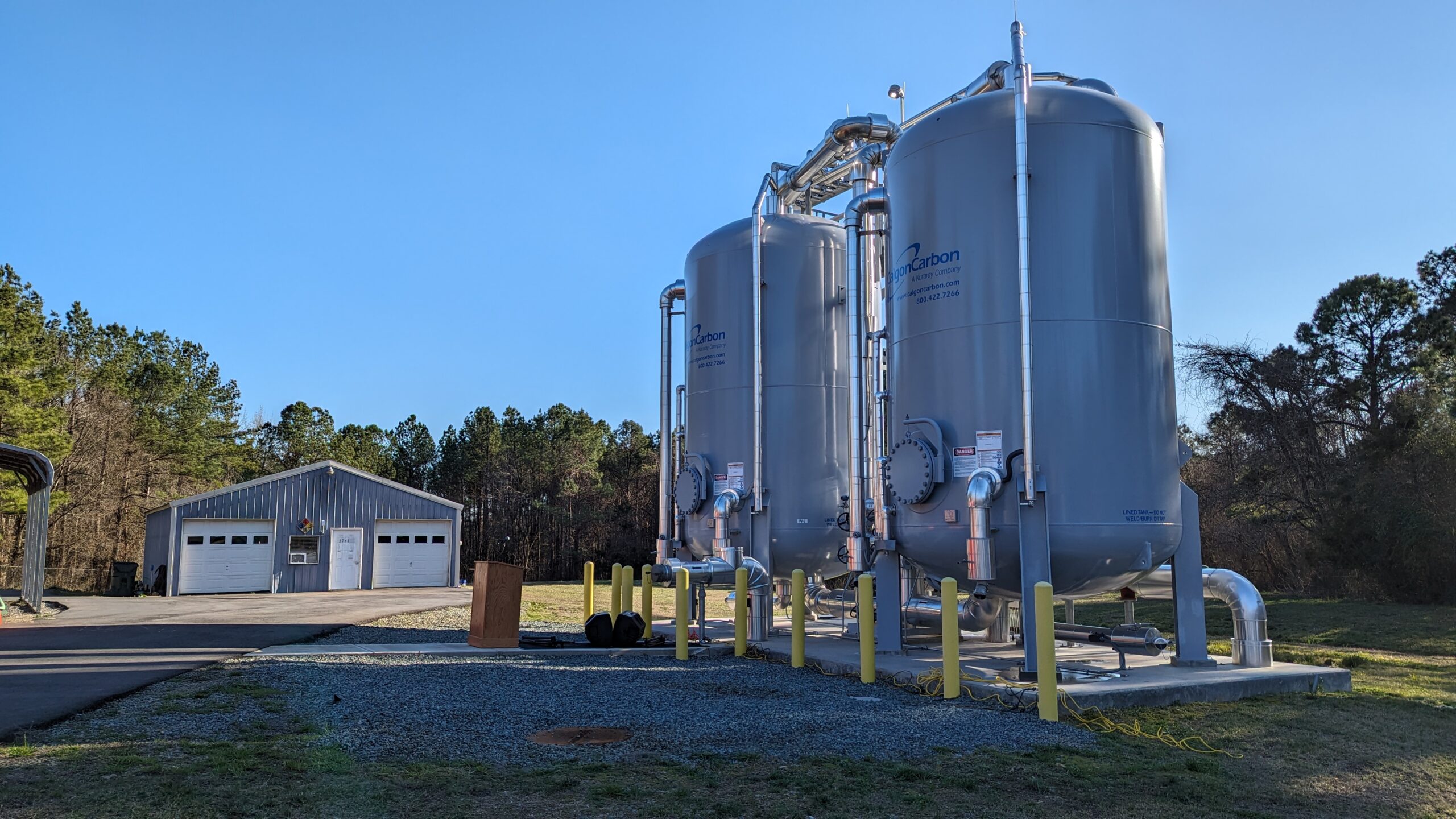
Pittsboro’s granulated activated carbon system (GAC system) is most visible with two silver towers on the edge of the water treatment plant. Town officials say the system eliminates, on average, 90 percent of PFAS compounds from the final treated drinking water.
Shipp said Thursday that since coming online two years ago, the GAC system has helped decrease around 90 percent of PFAS compounds and set an example to other local governments of its effectiveness.
But Pittsboro isn’t just stopping there. Last week, the town also approved funding for a pilot program with the Burlington company BNNano – which claims it has filtering processes that go beyond Pittsboro’s current methods.
“The promise of this new system,” Shipp told Chapelboro, “is that it can have a dramatic decrease in cost and physical size, and then it actually destroys the chemicals as well. That’s a key differentiator of it [as a product] and it works on more chemicals than the GAC System does.”
If it works, the method could lead to another example to rural communities how to prevent contamination and protect residents’ water quality. At the press conference, Reives commended the town for already setting those high standards for others to follow.
“I think Pittsboro shows [its leadership] in all facets – by being proactive, not just being reactive, but also making sure they explore all the options,” said the District 54 representative. “And they try and make sure anybody who is involved helps shoulder that load, so the burden doesn’t just fall on taxpayers [from] all the things that happen just because of some corporation.”
Chapelboro.com does not charge subscription fees, and you can directly support our efforts in local journalism here. Want more of what you see on Chapelboro? Let us bring free local news and community information to you by signing up for our newsletter.



